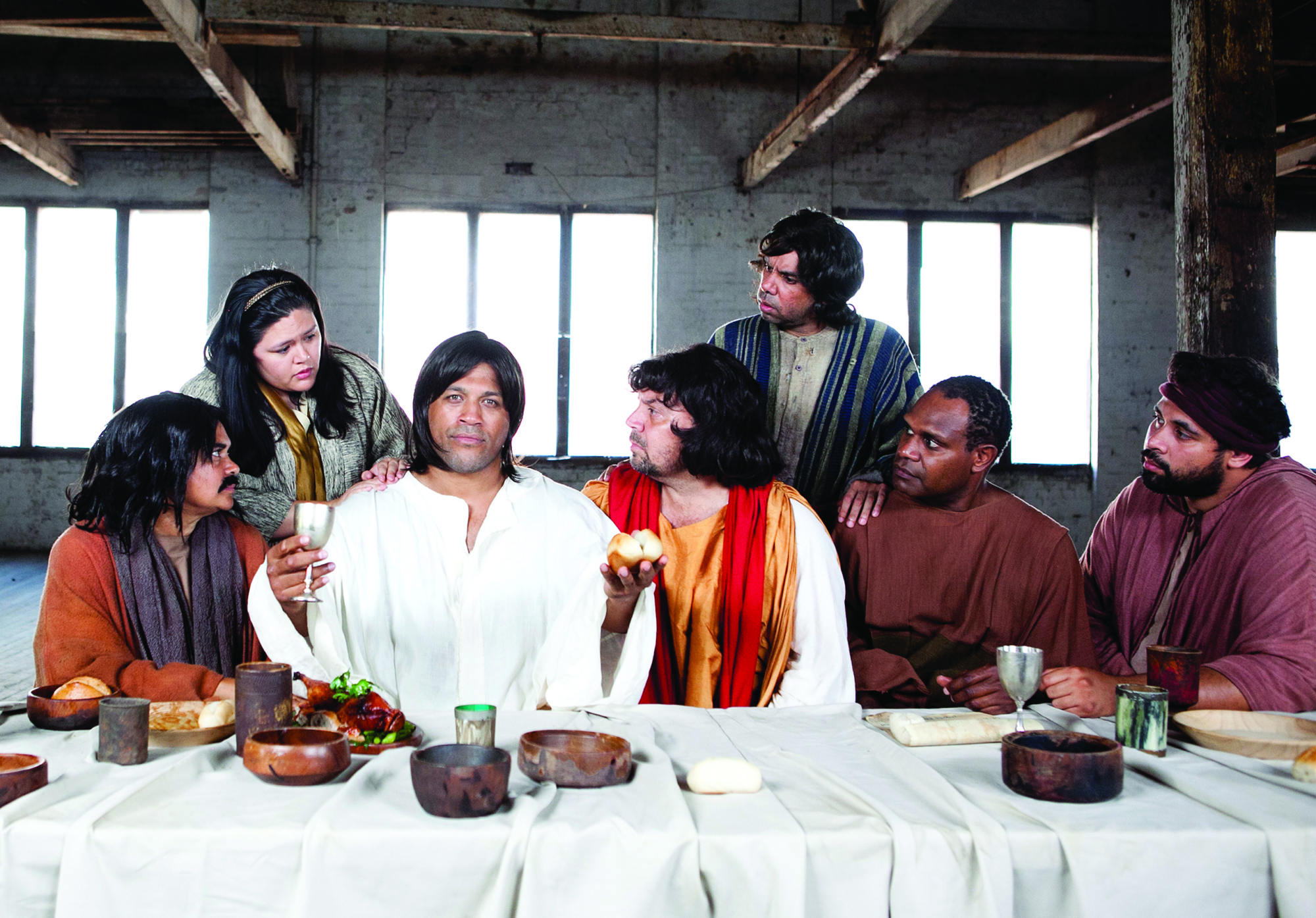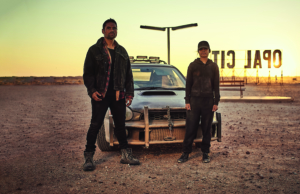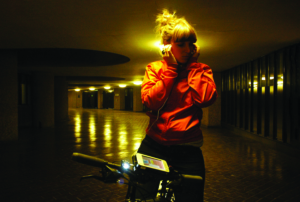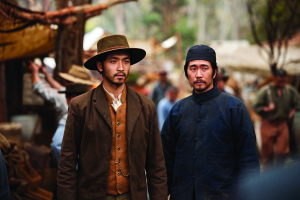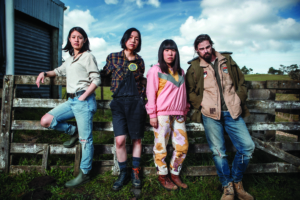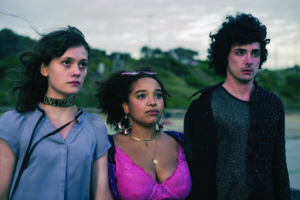Black Comedy, the first comedy to be produced by ABC Indigenous, is remarkable not just for the diversity displayed on screen but also for the ways in which the production process has strived to actively seek and foster new voices. The sketch show, which aired on ABC1 in late 2014, was created over two years through a unique development program that sought to upskill the next generation of Indigenous writers and performers. Founded in 2010, ABC Indigenous has produced a number of successful dramas, including the critically acclaimed Redfern Now and The Gods of Wheat Street. Department head Sally Riley considers comedy an important part of the department’s role and, prior to Black Comedy’s launch, told The Sydney Morning Herald that she viewed comedy ‘as an area [the department] could excel in […] because the Aboriginal sense of humour is one people respond to’.[1]Sally Riley, quoted in Kathryn Kernohan, ‘Black Comedy: Australia’s First Indigenous Sketch Show Since 1973 Hits the Screens’, The Sydney Morning Herald, 30 October 2014, <http://www.smh.com.au/entertainment/tv-and-radio/black-comedy-australias-first-indigenous-sketch-show-since-1973-hits-the-screens-20141024-11b1ub.html>, accessed 1 May 2015.
Despite the ABC’s strong history of comedy programming, Australian television has seen very little Indigenous comedy produced over the years. In 1973, the ABC commissioned and aired a pilot for an Indigenous sketch show called Basically Black, which was based on a successful theatre revue of the same name by the National Black Theatre. While the pilot was received positively, a full season was never commissioned. In many ways, then, Black Comedy is the spiritual product of that initial pilot, albeit screening more than forty years later.
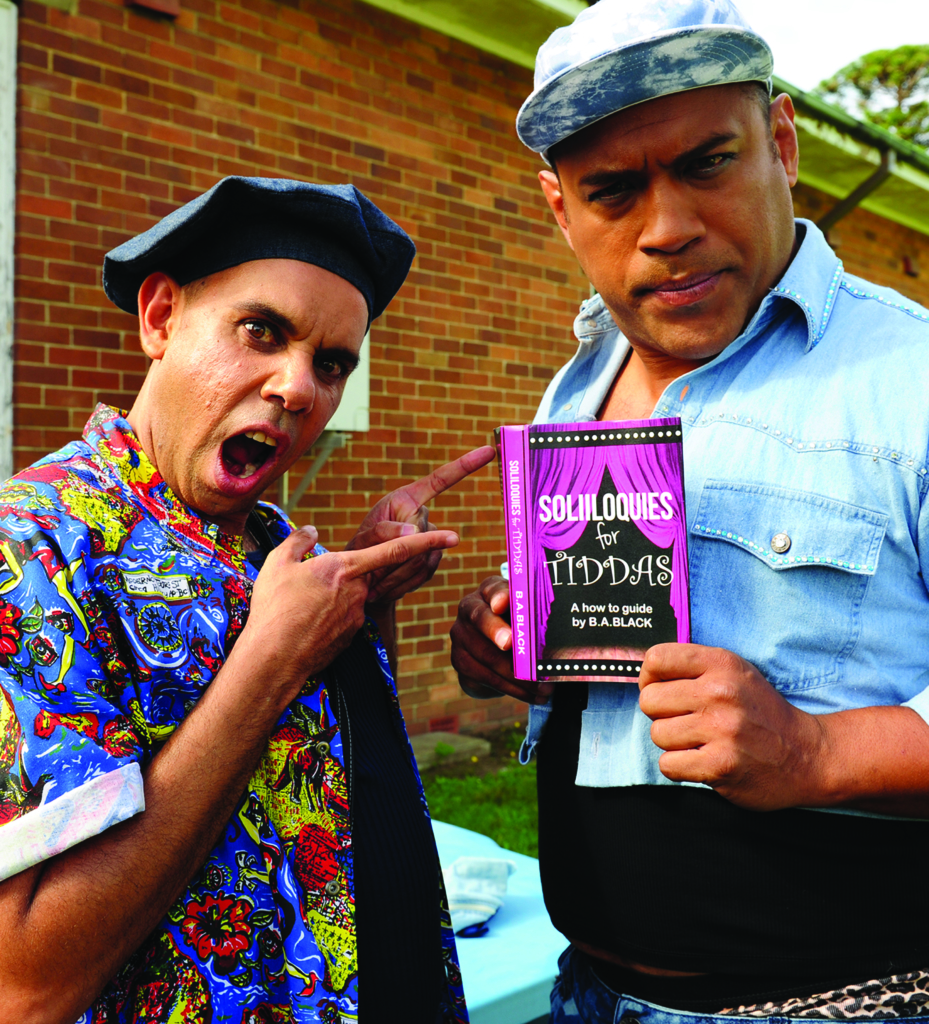
Along with Riley, the team behind Black Comedy includes producers Kath Shelper, best known for her work on acclaimed Australian film Samson & Delilah (Warwick Thornton, 2009), and Mark O’Toole, who has also worked behind the scenes on comedy programs including Spicks and Specks and Adam Hills Tonight. From the beginning, the series drew talent from different backgrounds, encouraging those involved to bring their varying expertise to the table. This emphasis on a diversity of skills and voices permeated every aspect of Black Comedy’s production. The team began by holding a callout for ‘Aboriginal people who thought they were funny’.[2]ibid. The callout was open to the general public and actively sought applications from underrepresented sections of the community. In an industry in which it is uncommon to recruit talent from outside the existing community, this process immediately marked Black Comedy as a radical production. Nakkiah Lui, an acclaimed playwright, responded to the callout and went on to be a writer and performer on the show. Lui, who is from Western Sydney, tells me that this kind of openness is rare.
That process of working quite hands-on and skilling up writers is rare. I think that’s a massive issue in the industry. The people who have the advantage are able to pursue a career in comedy, and that’s usually people who have the resources and the access.
A focus on skill-building, which helped to address issues of access, was seen as vital to the show’s success. From the open callout, the producers selected sixteen writers and performers from across the country and invited them to attend a week of intensive workshops. The workshops, which were held in Sydney, brought together talented individuals from diverse backgrounds, many of whom had never written comedy before. Some, like Lui, had experience in theatre, while others wrote TV drama or even poetry. Lui recalls that the workshop process was all about adapting their writing to suit the structures of sketch comedy. The show was created from scratch during those initial meetings, and the onus was placed firmly on the writers themselves.
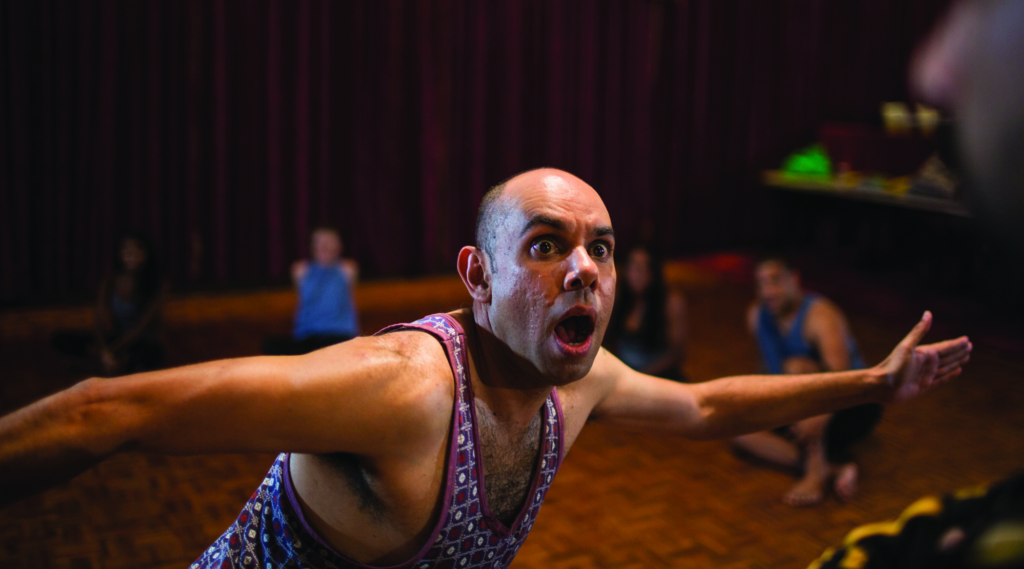
O’Toole adds that, with his experience as a writer and producer, he finds it’s ‘absolutely magnificent’ to ‘start with a blank whiteboard and fill it with ideas’.
To see [the writers’] skills just magnify and multiply over a number of days – it’s quite tiring and quite full-on, but it’s a really rewarding and a really interesting way to develop something.
The workshops covered the full breadth of the production process, from discussions about the basics of comedy, right through to the process of rehearsing, performing, filming and editing sketches. According to O’Toole, the ideas that formed the basis of the final product came from those original workshops. He says that it was really a matter of throwing around ideas and seeing what stuck. The team worked closely to write, rehearse and film sketches over the course of the week, working towards presenting a sizzle reel of material to ABC executives. A full season was commissioned as a result.
Black Comedy is alternatively topical and irreverent. Featuring a mix of standalone sketches and recurring characters, it blends observational humour with slapstick and parody.
‘That week for me really set the tone,’ recounts Lui. ‘It was [about] finding out what voices are out there, what people are talking about in the community. We didn’t really have much of a precedent for this kind of show.’
A core team was then selected from those who attended the workshops, and they were subsequently employed to write on the show. The group came together for occasional workshops and table reads, but the majority of writing and editing was done remotely, allowing writers to be based all over the country. This is another way in which the production sought to address issues of access: by not asking people to relocate to a metropolitan centre, the program was able to provide a more flexible working arrangement that enabled writers to remain within their own communities. Over the next eighteen months, the writers worked closely with O’Toole, Shelper and Riley to put the show together. O’Toole explains that, during this process, the focus was on helping the writers to develop their own style. ‘Kath [Shelper] and I went into it very much […] wanting to maintain the writers’ voices,’ he says. ‘So they were genuine Indigenous voices, and not writers being overwritten by non-Indigenous writers.’
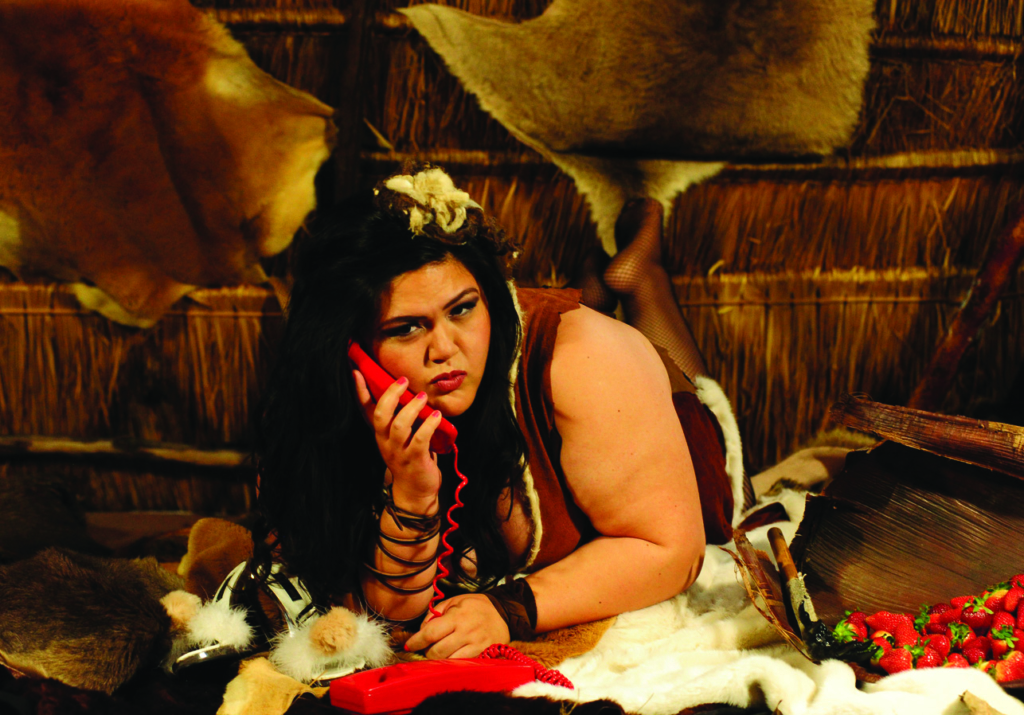
The finished program aired on Wednesday nights from 5 November 2014. Along with Lui, the core cast of performers included Steven Oliver, Aaron Fa’aoso, Jon Bell, Elizabeth Wymarra and Bjorn Stewart. With the exception of Fa’aoso, all of these cast members wrote for the show, with Oliver also working as the series’ associate producer. Appearing alongside these performers is an impressive line-up of guests, including Deborah Mailman, Brendan Cowell and Brooke Satchwell. Black Comedy is alternatively topical and irreverent. Featuring a mix of standalone sketches and recurring characters, it blends observational humour with slapstick and parody. The sketches represent a broad cross-section of Australia, and are set everywhere from city restaurants and suburban backyards, to rural parlours and bus stops. Ongoing sketches include ‘Blakforce’, which follows a crack team of officers who interrogate those deemed to not be behaving ‘black’ enough, and ‘Starblaks’, in which we watch the crew of Starship Hentaprise venturing boldly to the outlying regions of the galaxy.
‘A lot of people are really afraid to engage with Indigenous issues because they [are] just scared, they [don’t] know how to actually engage with that … I think getting people to laugh together is very much the first step in getting people to care.’
– Nakkiah Lui
Black Comedy was well received both by critics and audiences. Applauded for its silliness and wit, the show was praised by The Sydney Morning Herald’s Melinda Houston as an ‘encouraging signpost in the resurgence of [I]ndigenous culture as part of popular culture’,[3]Melinda Houston, ‘Black Comedy a Super Comedy for ABC Television’, The Sydney Morning Herald, 2 November 2014, <http://www.smh.com.au/entertainment/tv-guide/black-comedy-a-super-comedy-for-abc-television-20141024-11adt9.html>, accessed 1 May 2015. while TV Tonight’s David Knox recognised its unflinching look at modern Australia that ‘gives us license to laugh with Indigenous Australians’.[4]David Knox, ‘Black Comedy’, TV Tonight, 27 October 2014, <http://www.tvtonight.com.au/2014/10/black-comedy-2.html>, accessed 24 March 2015. Lui admits that she was always confident that the program would be a success, but was overwhelmed by just how well audiences responded.
It was really exciting. I never had any doubts about how good it was. The people who were on board were my peers and were incredibly talented. It was exciting to be able to introduce a different kind of show into the Australian community that really brought a different Indigenous voice to the forefront.
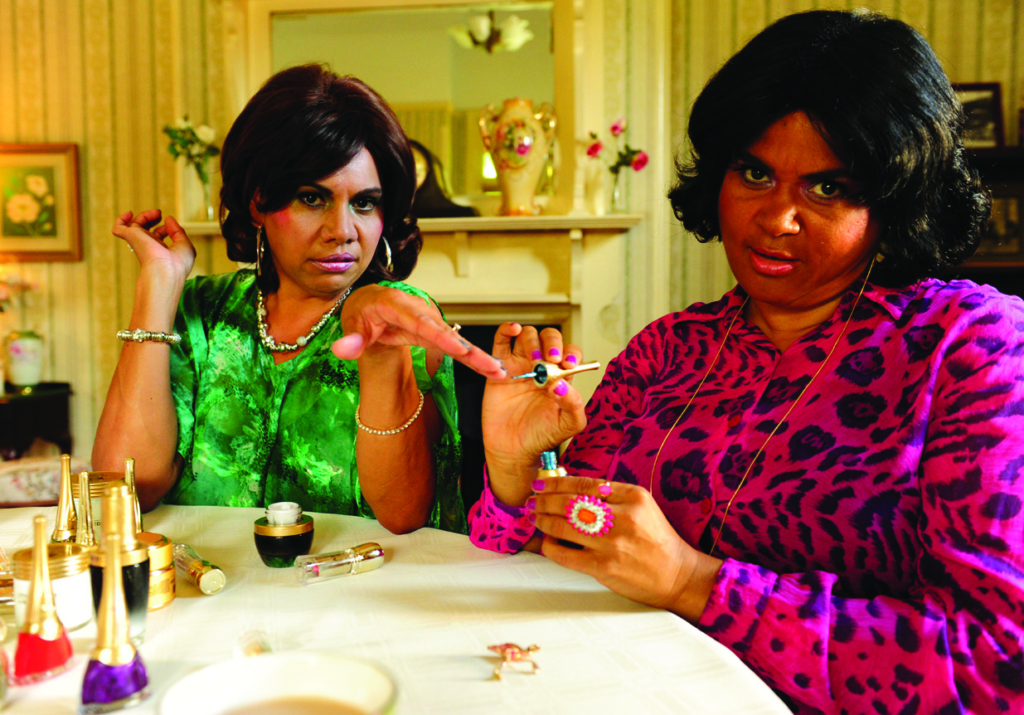
For Lui, the show is a watershed moment in Australian comedy. She believes that it has helped people to engage with Indigenous issues in a way that they haven’t been able to before. With its largely Indigenous cast and crew, Black Comedy is able to look critically at areas that comedy often shies away from.
A lot of people are really afraid to engage with Indigenous issues because they [are] just scared, they [don’t] know how to actually engage with that. How do you get people to care? It’s so much easier for people to switch off. I think getting people to laugh together is very much the first step in getting people to care.
The sketches deal with everything from cultural appropriation and identity policing, to biblical stories and family politics. Race relations are satirised in ‘Black Velvet’, featuring a dating service that finds white Australians their perfect Aboriginal ‘match’ to make latte-coloured babies with; in the character of Lillian (played by Lui), who finds racism in the most innocuous comments; and in a segment that invokes the Race Card Platinum, which can get you to the front of any queue. The show tackles queer identity (The Tiddas, played by Oliver and Fa’aoso, are two gay Aboriginal men locked in a never-ending battle of one-upmanship) and class issues (see ‘The Housewives of Narromine’). Ultimately, as Chelsea Bond, an Indigenous academic at the University of Queensland, contends, Black Comedy
does not try and appease non-Indigenous aspirations and concerns, nor does it seek to educate non-Indigenous audiences about ‘our ways’ […] there is a distinct brand of black humour on display. Growing up with a white mother and black father, it was humour that made the cultural divide between our respective families more apparent. Jokes were told differently and different things were considered funny [… The writers and cast members] don’t preach, apportion blame or dumb themselves down in dealing with a wide range of race taboos, instead they boldly have a crack at everyone equally.[5]Chelsea Bond, ‘Black Comedy: The ABC Makes a Bold Foray into Race Relations’, The Conversation, 6 November 2014, <http://theconversation.com/black-comedy-the-abc-makes-a-bold-foray-into-race-relations-33744>, accessed 1 May 2015.
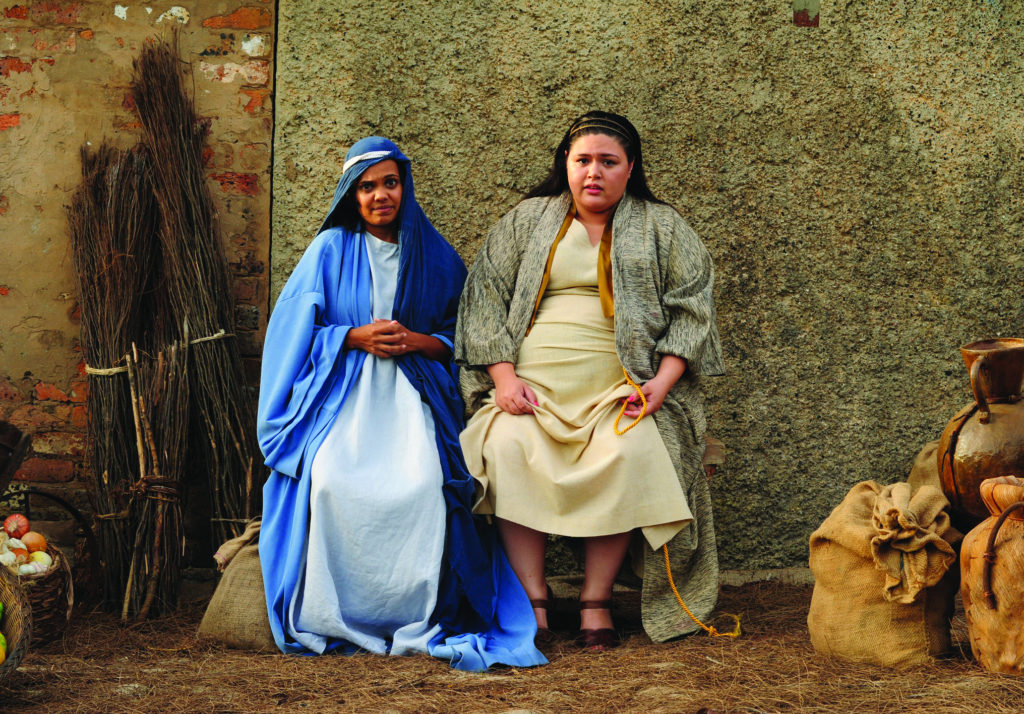
Production on the show’s second season has begun, and O’Toole says that ‘everything’s on the table’. The team has completed a second set of workshops following another open callout,[6]See ‘Black Comedy – Series 2 Callout’, ABC website, <http://www.abc.net.au/indigenous/about/black_comedy_callout.htm>, accessed 30 April 2015. with Oliver returning to mentor the new crop of talent. O’Toole believes that repeating the process for the second season makes sense, as it allows the show to integrate more voices from regions and communities that were missed during the first callout. ‘We want to surprise people,’ chimes O’Toole.
We want people to be as interested and excited and taken aback the second time around. It would be easy to just do exactly the same show. We want to push things a bit harder, be a bit [funnier], be a bit more interesting. And the best way to do that is to try out new voices and train up people to throw their chip in.
Black Comedy’s unflinching interrogation of diversity in Australian society is made all the more remarkable by this commitment to investing in an array of voices. The return on this investment is evident not just in the quality of the show itself, but also in the audience’s enthusiastic response. As Lui puts it:
I think the special thing about Black Comedy […] why it was so successful and why it spoke to the wider community, is that Black Comedy really took advantage of the fact that it’s not like other things on TV. I think it took advantage of that difference.
http://www.abc.net.au/tv/programs/black-comedy/
Endnotes
| 1 | Sally Riley, quoted in Kathryn Kernohan, ‘Black Comedy: Australia’s First Indigenous Sketch Show Since 1973 Hits the Screens’, The Sydney Morning Herald, 30 October 2014, <http://www.smh.com.au/entertainment/tv-and-radio/black-comedy-australias-first-indigenous-sketch-show-since-1973-hits-the-screens-20141024-11b1ub.html>, accessed 1 May 2015. |
|---|---|
| 2 | ibid. |
| 3 | Melinda Houston, ‘Black Comedy a Super Comedy for ABC Television’, The Sydney Morning Herald, 2 November 2014, <http://www.smh.com.au/entertainment/tv-guide/black-comedy-a-super-comedy-for-abc-television-20141024-11adt9.html>, accessed 1 May 2015. |
| 4 | David Knox, ‘Black Comedy’, TV Tonight, 27 October 2014, <http://www.tvtonight.com.au/2014/10/black-comedy-2.html>, accessed 24 March 2015. |
| 5 | Chelsea Bond, ‘Black Comedy: The ABC Makes a Bold Foray into Race Relations’, The Conversation, 6 November 2014, <http://theconversation.com/black-comedy-the-abc-makes-a-bold-foray-into-race-relations-33744>, accessed 1 May 2015. |
| 6 | See ‘Black Comedy – Series 2 Callout’, ABC website, <http://www.abc.net.au/indigenous/about/black_comedy_callout.htm>, accessed 30 April 2015. |
